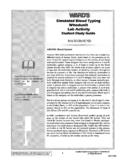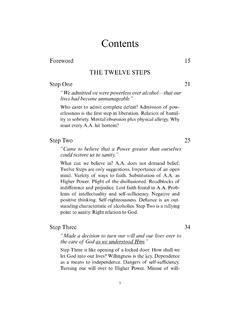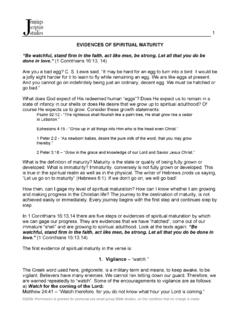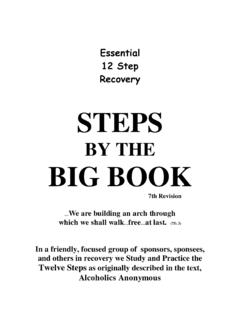Transcription of First Steps to Spiritual Growth: How to have meaningful ...
1 First Steps to Spiritual growth : How to have meaningful time with God By Rick Warren (Condensed from his book, Dynamic Bible Study Methods) Once you re convinced that a daily quiet time is necessary for Spiritual growth , then how do you go about having one? You may be motivated to do it but may not know how. You need to consider four essentials elements of a good quiet time: Start with the proper attitudes. Select a specific time. Choose a special place. Follow a simple plan. START WITH THE PROPER ATTITUDES In God's eyes, why you do something is far more important than what you do. On one occasion God told Samuel, The Lord does not look at the things man looks at. Man looks at the outward appearance, but the Lord looks at the heart. (1 Samuel 16:7, NIV*) It is quite possible to do the right thing but with the wrong attitude. This was Amaziah's problem, for he did what was right in the eyes of the Lord but not wholeheartedly.
2 (2 Chronicles 25:2) When you come to meet with God in the quiet time, you should have these proper attitudes: 1. Expectancy - Come before God with anticipation and eagerness. Expect to have a good time of fellowship with Him and receive a blessing from your time together. That was what David expected: "O God, You are my God, earnestly I seek You." (Psalm 63:1) 2. Reverence - Don't rush into God's presence, but prepare your heart by being still before Him and letting the quietness clear away the thoughts of the world. Listen to the prophet Habakkuk: "The Lord is in His holy temple; let all the earth be silent before Him." (Habakkuk 2:20; see also Psalm 89:7) Coming into the presence of the Lord is not like going to a football game or some other form of entertainment. 3. Alertness - Get wide-awake First . Remember that you are meeting with the Creator, the Maker of heaven and earth, the Redeemer of men.
3 Be thoroughly rested and alert. The best preparation for a quiet time in the morning begins the night before. Get to bed early so you will be in good shape to meet God in the morning; He deserves your full attention. 4. Willingness to obey - This attitude is crucial: you don't come to your quiet time to choose what you will do or not do, but with the purpose of doing anything and everything that God wants you to do. Jesus said, "If anyone chooses to do God s will he will find out whether My teaching comes from God or whether I speak on My own." (John 7:17) So come to meet the Lord having already chosen to do His will no matter what. SELECT A SPECIFIC TIME The specific time has to do with when you should have your quiet time and how long it should be. The general rule is this: The best time is when you are at your best! Give God the best part of your day - when you are the freshest and most alert.
4 Don't try to serve God with your leftovers (leftover time). Remember, too, that your best time may be different from someone else's. For most of us, however, early in the morning seems to be the best time. It was Jesus' own practice to rise early to pray and meet with the Father: Very early in the morning, while it was still dark, Jesus got up, left the house, and went off to a solitary place, where He prayed." (Mark 1:35) In the Bible many godly men and women rose early to meet with God. Some of these were: Abraham - Genesis 19:27 Moses - Exodus 34:4 Job - Job 1:5 Hannah and Elkanah - 1 Samuel 1:19 Jacob - Genesis 28:18 David - Psalms 5:3, 57:7,8 (See also Psalm 143:8; Isaiah 26:9; Ezekiel 12:8.) Throughout church history many Christians who were used most by God met with Him early in the morning. Hudson Taylor said, "You don't tune up the instruments after the concert is over.
5 That's stupid. It's logical to tune them up before you start." The great revival among British college students in the late 19th century began those historic words: "Remember the Morning Watch!" So we need to tune ourselves up at the start of each day as we remember the Morning Watch. If Jesus is really in First place in our lives, we ought to give Him the First part of our day. We are to seek His Kingdom First (see Matthew 6:33). Doctors tell us that the most important meal of the day is breakfast. It often determines our energy levels, alertness, and even moods for the day. Likewise, we need a " Spiritual breakfast" to start our day off right. Finally, in the morning our minds are uncluttered from the day's activities. Our thoughts are fresh, we're rested; tensions have not yet come on us, and it's usually the quietest time. One mother sets her alarm clock for 4 , has her quiet time, goes back to bed, and then rises when everyone else in the household gets up.
6 Her explanation is that with kids around the house all day, early morning is the only time when it is quiet and she can be alone with God. It works for her; you need to select a time that will work for you. You might even consider having two quiet times (morning and night). Dawson Trotman, founder of the Navigators, used to have code letters for his night quiet time: HWLW. Whenever he was with a group of people at night or home with his wife and the conversation seemed to be ending, he would say, "All right, HWLW." HWLW stood for "His Word the Last Word;" and he practiced that through the years as a way of ending a day with one's thoughts fixed on the Lord (Betty Lee Skinner, Daws, Zondervan, 1974, p. 103). Stephen Olford, a great Christian and minister in New York for many years, said, I want to hear the voice of God before I hear anyone else s in the morning, and His is the last voice I want to hear at night.
7 David and Daniel even met with the Lord three times each day (see Psalm 55:17; Daniel 6:10). Whatever time you set, be consistent in it. Schedule it on your calendar; make an appointment with God as you would with anyone else. Make a date with Jesus! Then look forward to it and don't stand Him up. A stood-up date is not a pleasant experience for us, and Jesus does not like to be stood up either. So make a date with Him and keep it at all costs. The question is often asked, "How much time should I spend with the Lord?" If you've never had a consistent quiet time before, you may want to start with seven minutes (Robert D. Foster, Seven Minutes with God, NavPress, 1997) and let it grow naturally. You should aim to eventually spend not less than 15 minutes a day with the Lord. Out of 168 hours we all have during a given week, 1 hour and 45 minutes seems terribly small when you consider that you were created to have fellowship with God.
8 Here are some additional guidelines: Don't try for a two-hour quiet time at First . You'll only get discouraged. You must grow in this relationship as you do in any other. So begin with a consistent seven minutes and let it grow; it's better to be consistent with a short time than to meet for an hour every other week. Don't watch the clock. Clock-watching can ruin your quiet time faster than almost anything else. Decide what you can do in the Word and prayer during the time you have selected; then do it. Sometimes it will take longer than you have set aside, and sometimes less time. But don't keep looking at your watch. Don't emphasize on quantity, emphasize on quality. There is nothing super Spiritual about have a two-hour quiet time. It's what you do during your time - 15 minutes or two hours or anything in between - that's important. Aim for a quality relationship with the Lord.
9 CHOOSE A SPECIAL PLACE The location where you have your quiet time is also important. The Bible indicates that Abraham had a regular place where he met with God (Genesis 19:27). Jesus had a custom of praying in the Garden of Gethsemane on the Mount of Olives. "Jesus went out as usual to the Mount of Olives, and His disciples followed Him." (Luke 22:39, emphasis added) Your place ought to be a secluded place. This is a place where you can be alone, where it's quiet, and where you will not be disturbed or interrupted. In today's noisy Western World, this may take some ingenuity, but it is necessary. It ought to be a place where you can pray aloud without disturbing others; where you have good lighting for reading (a desk, perhaps); where you are comfortable. (WARNING: Do not have your quiet time in bed. That's too comfortable!) Your place ought to be a special place.
10 Wherever you decide to meet with the Lord, make it a special place for you and Him. As the days go by, that place will come to mean a lot to you because of the wonderful times you have there with Jesus Christ. Your place ought to be a sacred place. This is where you meet with the living God. Where you meet the Lord can be just as holy as the place where Abraham met God. You don't have to be in a church building. People have had their quiet times in their cars parked in a quiet place, in an empty closet at home, in their backyards, and even in a baseball dugout. Each of these places has become sacred to them. FOLLOW A SIMPLE PLAN Someone has said, "If you aim at nothing, you are sure to hit it!" To have a meaningful quiet time, you will need a plan or some kind of general outline to follow. The main rule is this: Keep your plan simple. You will need the following three items for your planned quiet times: A Bible - a contemporary translation (not a paraphrase) with good print, preferably without notes.








